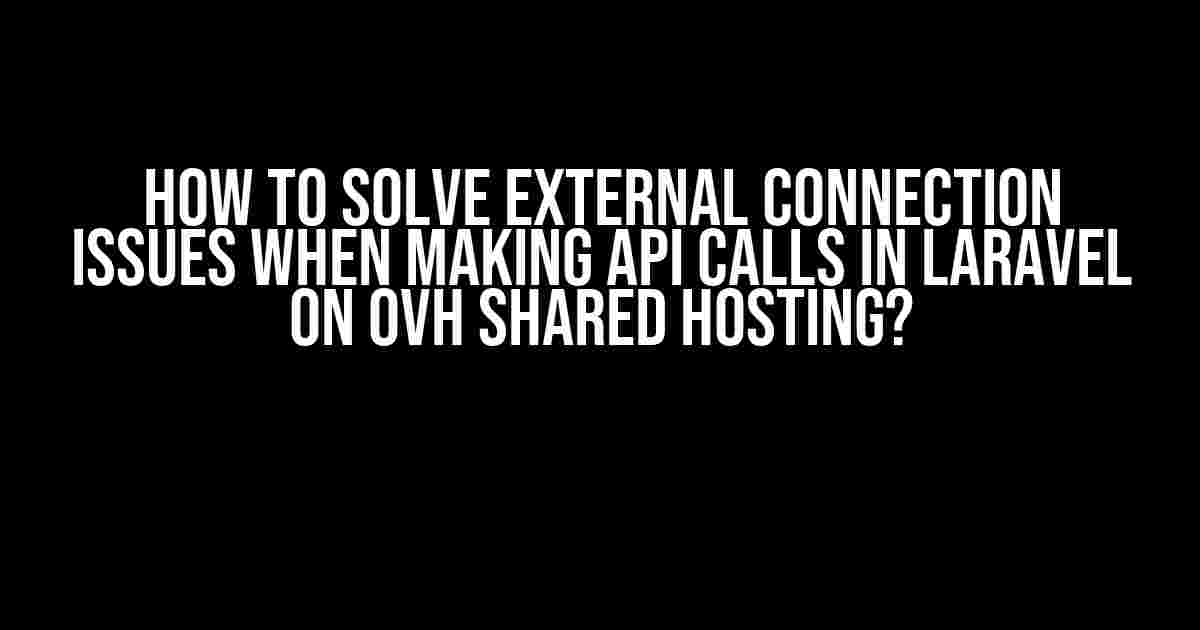Are you tired of getting those pesky “Connection Timed Out” or “Connection Refused” errors when making API calls in your Laravel application on OVH shared hosting? You’re not alone! In this article, we’ll dive into the common issues and provide you with step-by-step solutions to overcome these frustrating external connection problems.
Understanding the Problem
Before we dive into the solutions, it’s essential to understand the root cause of the issue. When making API calls from your Laravel application on OVH shared hosting, you might encounter connection issues due to various reasons:
- Firewall restrictions: OVH shared hosting has strict firewall rules that might block outgoing connections to external APIs.
- Rate limiting: Some APIs have rate limits in place to prevent abuse, which can lead to connection issues if not handled properly.
- Contact timeout: The default timeout for API calls in Laravel might be too low, causing connections to time out prematurely.
- Server configuration: OVH shared hosting has specific server configurations that might affect outgoing connections.
Configuring Laravel for External API Calls
To overcome external connection issues, you need to configure Laravel to handle API calls efficiently. Follow these steps:
-
increases the timeout: In yourconfig/http.phpfile, update thetimeoutvalue to a higher number (e.g., 30 seconds) to give your API calls more time to complete:'timeout' => 30, -
sets the retry mechanism: In yourconfig/http.phpfile, enable the retry mechanism by setting theretry_aftervalue to a suitable number (e.g., 3 attempts) and theretry_waitvalue to a delay between attempts (e.g., 2 seconds):'retry_after' => 3, 'retry_wait' => 2, -
uses a better HTTP client: Install theguzzlehttp/guzzlepackage using Composer:composer require guzzlehttp/guzzleThen, update your
config/http.phpfile to use the Guzzle HTTP client:'client' => \GuzzleHttp\Client::class,
OVH Shared Hosting Specific Configuration
OVH shared hosting has some unique requirements to ensure proper outgoing connections. Follow these additional steps:
-
whitelist IP addresses: Log in to your OVH control panel and whitelist the IP addresses of the APIs you’re trying to connect to. This will allow outgoing connections to those specific IPs. -
use the OVH proxy: OVH provides a proxy server to help with outgoing connections. Update yourconfig/http.phpfile to use the OVH proxy:'proxy' => [ 'http' => 'http://proxy.ovh.net:3128', 'https' => 'http://proxy.ovh.net:3128', ],
API-Specific Configuration
Some APIs require special handling to overcome connection issues. Follow these API-specific guidelines:
| API | Solution |
|---|---|
| Stripe | Use the Stripe PHP library and increase the timeout to 30 seconds. |
| PayPal | Use the PayPal PHP SDK and set the timeout to 30 seconds. Also, ensure you’re using the correct API endpoint. |
| Use the Facebook PHP SDK and increase the timeout to 30 seconds. Also, ensure you’re using the correct API endpoint and handling rate limits. |
Additional Tips and Tricks
To further improve your API call experience, follow these additional tips:
caching: Implement caching mechanisms, like Redis or Memcached, to reduce the number of API calls and alleviate connection issues.queueing: Use Laravel’s built-in queue system to handle API calls asynchronously, reducing the load on your application and improving overall performance.logging and monitoring: Implement logging and monitoring tools, like Laravel’s built-in logging or tools like New Relic, to track API call performance and identify bottlenecks.
Conclusion
By following these steps and configuring Laravel and OVH shared hosting properly, you should be able to overcome external connection issues when making API calls. Remember to stay vigilant and monitor your API call performance to identify any potential issues early on.
Happy coding, and may your API calls be forever successful!
Frequently Asked Question
Are you tired of encountering external connection issues when making API calls in Laravel on OVH shared hosting? Worry not, dear developer, for we’ve got you covered!
What are the common reasons behind external connection issues in Laravel on OVH shared hosting?
Ah, my friend, the usual suspects include firewall restrictions, DNS issues, and incorrect configuration of the `verify_peer` and `verify_peer_name` settings in your Laravel project. Don’t worry, we’ll dive into the solutions soon!
How do I check if my OVH shared hosting has firewall restrictions that might be blocking my API calls?
Easy peasy! Simply contact your OVH support team and ask them to check if there are any firewall rules blocking your API calls. Alternatively, you can try using a tool like `curl` or `nmap` to test your connection. If you’re still stuck, try reaching out to OVH’s community forums for some extra help!
How can I configure the `verify_peer` and `verify_peer_name` settings in Laravel to avoid SSL/TLS issues?
Sweet question! To avoid SSL/TLS issues, you can set `verify_peer` to `false` and `verify_peer_name` to `false` in your Laravel project’s `config/guzzlehttp/guzzle.php` file. This will allow Guzzle to ignore SSL/TLS verification. However, please be aware that this reduces the security of your API calls, so use it wisely!
Are there any Laravel packages that can help me debug and resolve external connection issues?
You bet! There are some amazing Laravel packages out there that can help you debug and resolve external connection issues. For instance, you can use the `guzzlehttp/guzzle` package to log and debug your HTTP requests. Another great option is the `laravel-debugbar` package, which provides a nifty debug bar to help you identify issues.
What’s the best approach to test and troubleshoot external API calls in Laravel?
Excellent question, my friend! When testing and troubleshooting external API calls in Laravel, it’s essential to use a systematic approach. Start by checking your API call logs, then use tools like Postman or cURL to test the API calls independently. If issues persist, try debugging your code using tools like Xdebug or Laravel’s built-in debugging features. Last but not least, don’t hesitate to reach out to the API provider’s support team for assistance!

